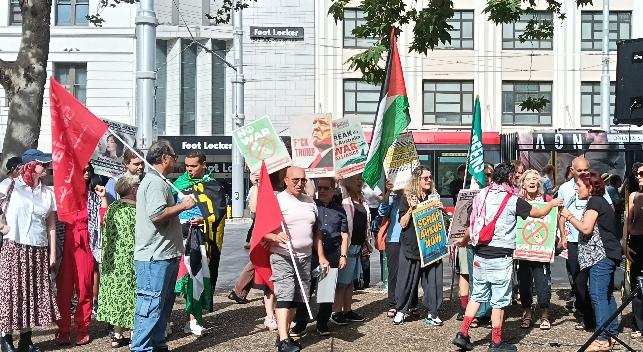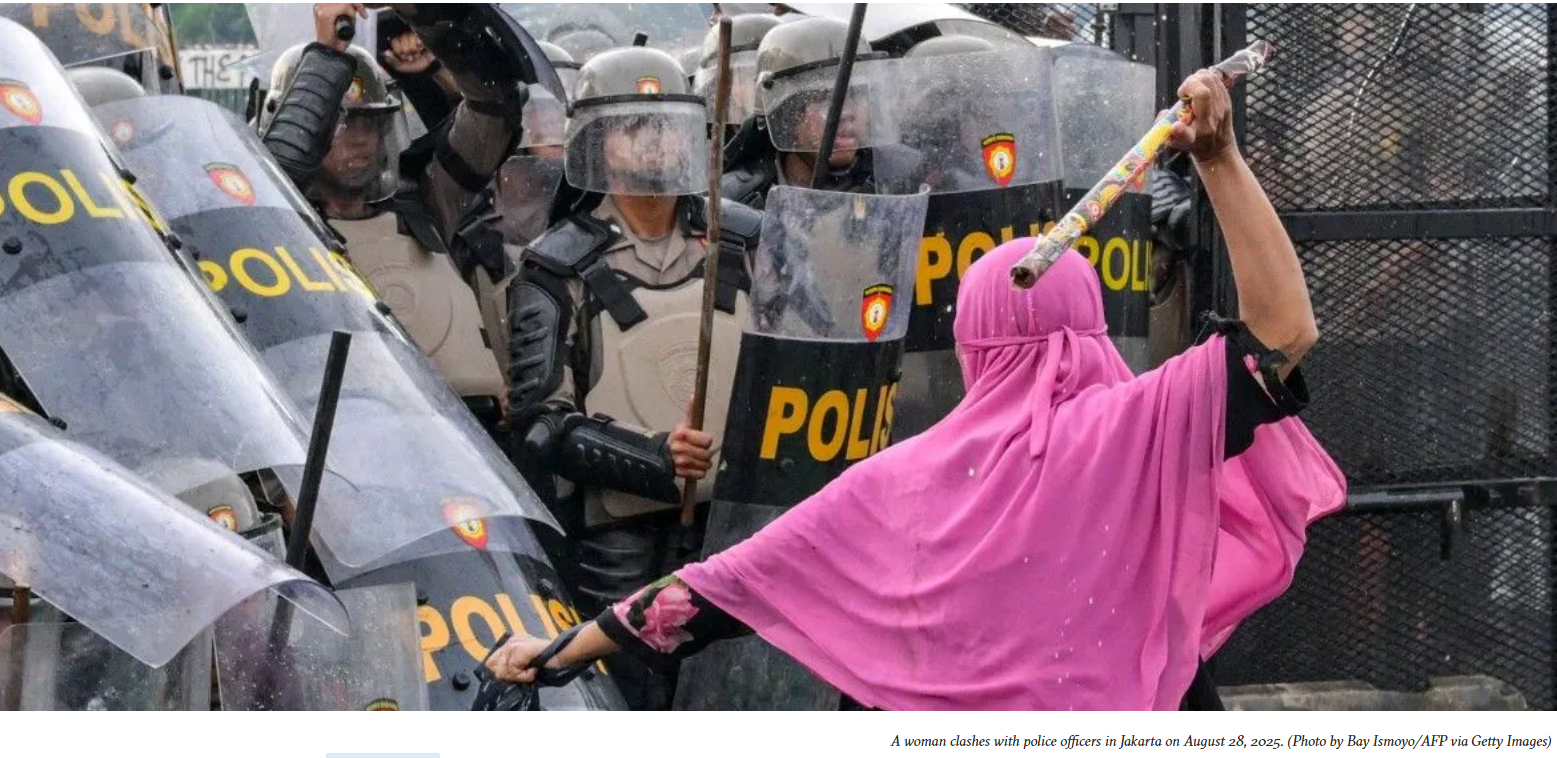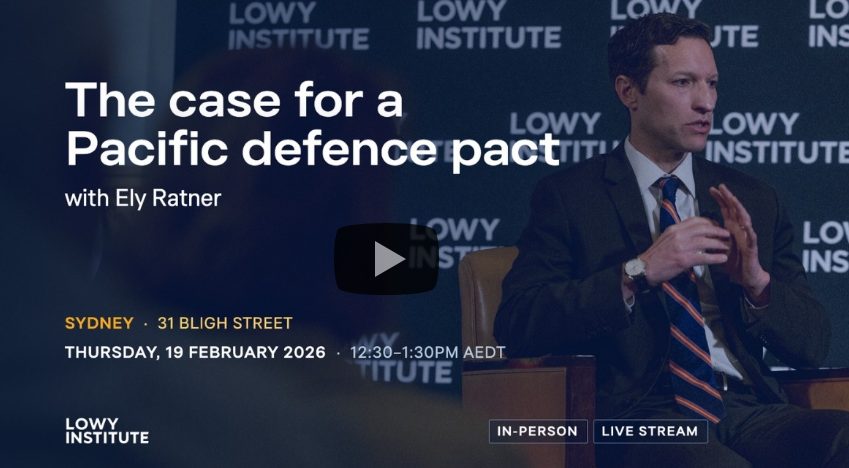Written by: Lindy Nolan on 2 March 2026
(Photo supplied)
The day after Israel and the US began bombing Iran, a small protest in Sydney united under these slogans, 'No to War, Yes to Freedom and Self Determination – The liberation of the Iranian people will come through their own independent and conscious struggle.’
The rage of Iranians at the horrors unfolding and the ignorance of a larger group celebrating nearby with US and even Israeli flags and calling for a new Shah, was expressed by a woman, “The enemy of my enemy is not necessarily my friend.”
The US and Israel, and Iranian regime are most bitter enemies. But neither are friends of the Iranian people. The speaker told of food and water being cut off to political prisoners.
Lindy Nolan spoke on behalf of the CPA(ML). Her speech is below.
Today we honour the heroic Iranian masses facing the armed might of Israel and of US imperialism. They will never accept another US puppet shah with their mass murders torture and mass jailings.
The masses make history. And all peoples have the right to resist, to overthrow oppression by their ruling class, to organise for women’s freedom and build their own future. We cannot deny Iranians that right. We cannot put limits on it, especially with US imperialism on their doorstep.
War is the continuation of politics by other means. US imperialism’s economic war with China is now a military war with China’s allies. And Australia is involved.
In the 1970s Henry Kissinger called Australia a western “outpost on the edge of Asia”. It’s now a spear projecting US power, into Asia and the Middle East. The US Pine Gap spy base on Arrernte, land near Mparntwe Alice Springs, guided missiles and now drones, to Iraq Gaza, Lebanon and Iran. It chooses the human targets – children, schools, hospitals. US imperialism demands billions, trillions of dollars needed for life, for our schools, hospitals, the homeless, our culture, environment. All for death and war.
US imperialism is at war with its own people and at war with the people of the world.
We oppose it with all our might.
We’ve been in every US war
We honour First Peoples. Since British invasion they fought for their lands, their waters, their cultures. Their right to live. We honour their 140 years of armed struggle. On this street in the 1790s, Pemulwuy led an armed attack. British colonialism became imperialism. First Peoples never surrendered.
Australian governments took us to every British war. In World War One, Labor’s opposition leader pledged us to England to the last man and last shilling. In World War 2, PM Menzies said, “It is my melancholy duty” to announce Britain is at war and therefore “Australia is at war.” Before the war Menzies met Hitler, praised him as a as “good for Germany and the German people”, that Australians should be “more like Germans”. He starved workers and broke a strike to send pig iron to Japan. It came back as bombs.
When he declared war for England, Australian troops were in North Africa. None here defending Australia. Menzies went to England. This is our history.
US imperialism long ago replaced British imperialist control of Australia. In World War Two, Labour PM John Curtin turned from Britain, which betrayed us, to the US. US general Macarthur called him a traitor in relation to operational differences. Said the US would never trust Australia again.
We’ve been in every US war since. Pine Gap now ensures it’s automatic. Beyond our control.
There is no shortcut to victory
The core of imperialism is not military. It’s economic. It’s monopoly capitalism. US imperialism controls the commanding heights of our economy. That’s what all the wars are about. Protecting obscene wealth and privilege.
When anyone tells you the US will support us, tell them this history. When they say, “Don’t bring foreign wars here”, tell them that we are already at war against Iran and that there’s more to come. That subservience to US imperialism makes Australia a target in any war with China. That the US will assert its interests and demand we obey.
We fight US imperialism here. The March for Humanity shows how broad anti-imperialist feeling is. But resistance is not deep enough. The masses and the masses alone make history. We need to go deep among the people, to alert them about what we face, to educate them, to organise, to mobilise them.
We must meet them where they are. In their workplaces, neighbourhoods, community groups, cultural and sporting groups. In every area of life. We must be present and active and organised. There is no shortcut.
The working class, from teachers to delivery riders, nurses to construction workers, has been systematically disorganised, disempowered. Empty slogans and one-size-fits-all tactics cannot replace deep listening to the people, learning from them, taking their ideas and concentrating them into theory, into strategy and tactics, to take back to struggle.
We must unite all the small struggles into a huge alliance against US imperialism, an end to economic political and military subservience: No to war. Close Pine Gap. Close all US military bases. Independence for Australia.
Today, above all, we salute and stand for the heroic people of Iran. There will be setbacks. But nothing can stop their struggle.
Victory to the people of Iran!








